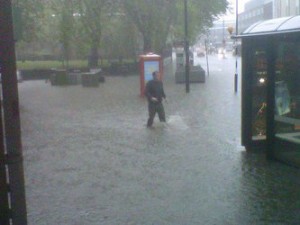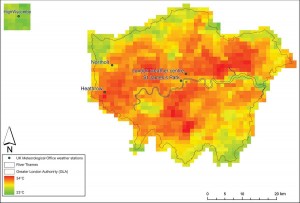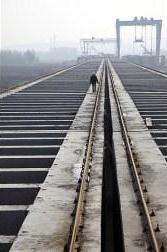 The £2.7M SINATRA (Susceptibility of catchments to INTense RAinfall and flooding) Project, funded by NERC, the Environment Agency and the UK Met Office under the Flooding From Intense Rainfall thematic programme, will start later in 2013. This large consortium project is led by Dr Hannah Cloke at Reading University and deputy director Prof Hayley Fowler in CESER.
The £2.7M SINATRA (Susceptibility of catchments to INTense RAinfall and flooding) Project, funded by NERC, the Environment Agency and the UK Met Office under the Flooding From Intense Rainfall thematic programme, will start later in 2013. This large consortium project is led by Dr Hannah Cloke at Reading University and deputy director Prof Hayley Fowler in CESER.
SINATRA assembles a multidisciplinary team of world-leading experts from academia (Reading University, Bristol University, Newcastle University (CESER, CeG and Geography), Exeter University, Hull University, King’s College London), industry (Halcrow and JBA), and government (UK Met Office (UKMO) and their joint Flood Forecasting Centre (with the Environment Agency), the British Geological Survey (BGS), the Health and Safety Laboratory (HSL) and the Cabinet Office’s Natural Hazards Partnership.)
SINATRA aims to advance scientific understanding of the drivers, thresholds, and impacts of flooding from intense rainfall in ‘at-risk’ UK catchments and to translate this small-scale process understanding into new open source model architectures and parameterisations to enable the development of decision-support tools, improving the capacity of forecasting agencies to deliver impacts-based warnings and predictions needed for managing Flooding From Intense Rainfall.
Contributions from CESER include expertise in crowd-sourcing (Dr Geoff Parkin and Mr David Alderson), hydrodynamic modelling (Dr Vedrana Kutija and Dr Qiuhua Liang), laser scanning (Dr Pauline Miller), atmospheric precursors (Prof Hayley Fowler and Dr Stephen Blenkinsop), historical flood reconstruction (Dr David Archer, visiting fellow), risk assessment (Prof Enda O’Connell, Dr John Ewen and Dr Greg O’Donnell) and rapid field response (Dr Andy Large and Prof Andy Russell, Geography).









